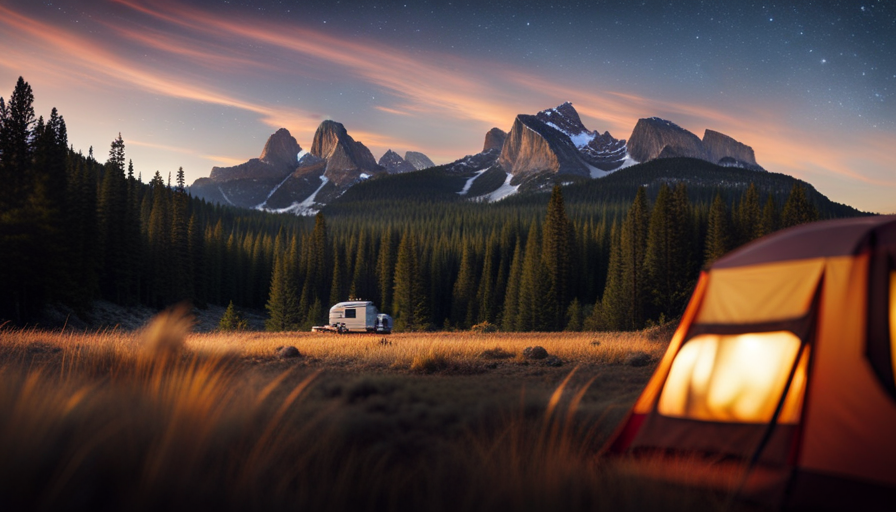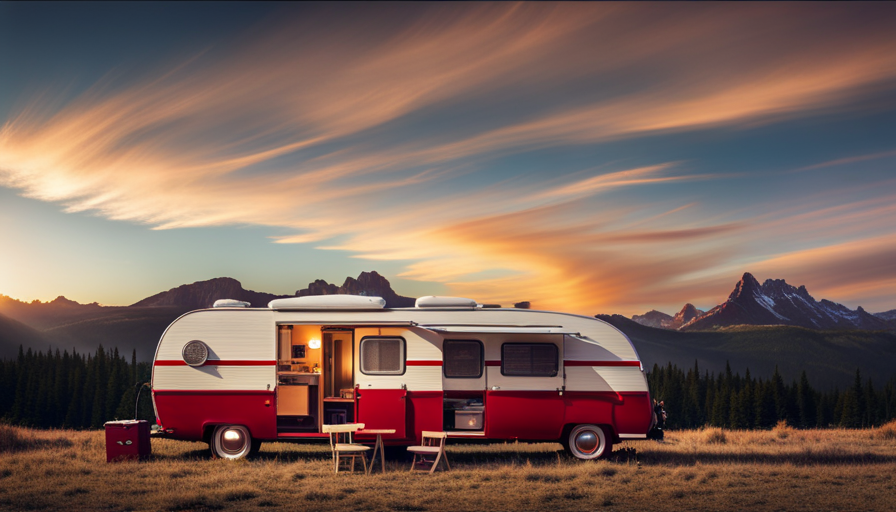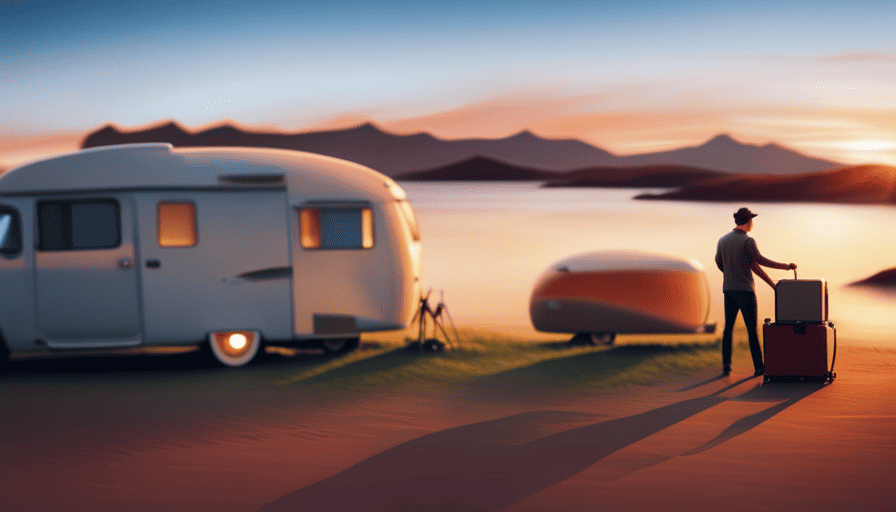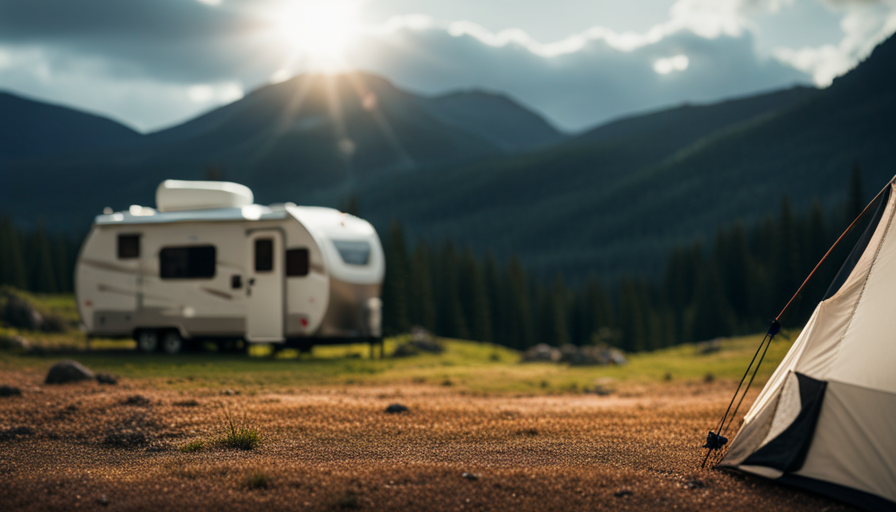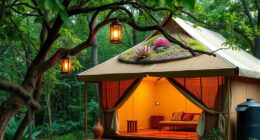Are you aware that selecting the correct size generator for your 30-foot camper can greatly enhance your camping experience by providing comfort and convenience?
With so many options available, it’s essential to understand your power needs, calculate wattage requirements, and consider factors like fuel options, noise levels, and portability.
According to experts, an average 30 ft camper requires a generator with a wattage capacity of around 3,000 to 4,000 watts. This will provide enough power to run essential appliances and devices such as air conditioning units, refrigerators, and lighting systems.
In this article, we will guide you through the process of determining the perfect generator size for your 30 ft camper, taking into account various factors that will help you make an informed decision.
So, let’s delve into the world of generators and find the perfect match for your camping adventures!
Key Takeaways
- Experts recommend a generator with a wattage capacity of 3,000 to 4,000 watts for a 30 ft camper.
- Assess power needs by calculating wattage requirements of each appliance and considering energy-efficient options.
- Consider fuel options (gasoline, propane, diesel) and compare their advantages and disadvantages in terms of emissions, efficiency, and refueling frequency.
- Consult the manufacturer’s recommendations for the appropriate generator size and consider the power requirements and generator types suggested by the manufacturer.
Assess Your Power Needs
To accurately determine the appropriate generator size for your 30 ft camper, you need to assess your power requirements. This step is crucial in ensuring that you choose a generator that can meet your energy needs while you’re on the road.
The first thing to consider is the power usage of your appliances. Take some time to calculate the wattage requirements of each device you plan to use in your camper. This will give you an idea of how much power you’ll need to run everything smoothly.
In addition to calculating power usage, it’s also important to consider energy-efficient appliances. Opting for energy-saving devices can significantly reduce the overall power consumption of your camper. Look for appliances that have an Energy Star rating or are specifically designed to be energy efficient. This way, you’ll be able to maximize the use of your generator without wasting unnecessary power.
By assessing your power needs and considering energy-efficient appliances, you’ll be well on your way to finding the perfect generator for your 30 ft camper. In the next section, we will dive deeper into how to calculate the wattage requirements for your specific power needs.
Calculate Wattage Requirements
Determine how much power you’ll need to keep all your appliances and devices running smoothly in your cozy home away from home. Calculating power needs is an important step in selecting the right generator for your 30 ft camper. To make this process easier, here are three factors to consider:
-
List all your appliances and devices: Start by making a comprehensive list of all the appliances and devices you plan to use in your camper. This includes items like air conditioners, refrigerators, microwaves, TVs, and chargers.
-
Determine the power requirements: Look at the wattage rating for each item on your list. This information can usually be found on the appliance or in the user manual. Add up the wattage for all the items to calculate the total power requirements.
-
Consider start-up power: Some appliances, like air conditioners and refrigerators, require extra power to start up. Make sure to account for this additional power surge when calculating your wattage requirements.
By calculating your power needs and considering factors like start-up power, you can determine the wattage requirements for your 30 ft camper. This information will help you choose the right generator type that can meet your power needs without any issues.
Now, let’s move on to the next section about choosing the right generator type.
Choose the Right Generator Type
When selecting the perfect generator for your 30-foot camper, it’s crucial to consider the appropriate type that suits your power needs and ensures a smooth camping experience.
One important factor to consider is the noise level of the generator. You don’t want to disturb the peaceful camping environment with a loud and noisy generator. Look for generators that are specifically designed to operate quietly, around 50 to 60 decibels, to keep the noise levels to a minimum.
Another aspect to consider is generator portability. Since you’ll be traveling with your camper, it’s important to choose a generator that is easy to transport and doesn’t take up too much space. Look for generators that are compact and lightweight, making them easy to store and move around as needed.
By choosing a generator with low noise levels and high portability, you can ensure a pleasant camping experience without disturbance.
Now, let’s move on to the next section where we will consider fuel options for your generator.
Consider Fuel Options
When choosing a generator for your 30 ft camper, it’s important to consider the fuel options available. Gasoline, propane, and diesel generators are the most common choices. Gasoline generators are typically the most affordable and widely available, but they may require more maintenance.
Propane generators are cleaner burning and often more convenient because propane can be easily stored and transported.
Diesel generators are known for their fuel efficiency and durability, but they can be more expensive upfront.
Evaluating fuel availability and convenience is crucial because you want to ensure that you can easily access and refill the fuel source for your generator while on the road.
Compare gasoline, propane, and diesel generators
To find the right size generator for your 30 ft camper, consider comparing the advantages and disadvantages of gasoline, propane, and diesel generators.
When evaluating the environmental impact, gasoline generators produce the most emissions, propane generators produce the least, and diesel generators fall somewhere in between.
In terms of efficiency levels, gasoline generators are the least efficient, propane generators are more efficient, and diesel generators are the most efficient.
Gasoline generators may be the most convenient option due to the widespread availability of gasoline, but propane and diesel generators offer longer runtimes and require less frequent refueling.
When considering fuel availability and convenience, it is important to assess the accessibility of gasoline, propane, and diesel in the areas where you plan to travel with your camper.
Evaluate fuel availability and convenience
Considering fuel availability and convenience, it’s crucial to imagine the accessibility of gasoline, propane, and diesel in the areas where you plan to travel with your camper. Here are four key points to keep in mind:
-
Fuel Efficiency: Gasoline generators tend to be less fuel-efficient compared to propane and diesel options. This means you may need to carry extra fuel for longer trips.
-
Environmental Impact: Propane and diesel generators are generally considered more environmentally friendly than gasoline generators. They produce fewer emissions and are better for the environment.
-
Fuel Availability: Gasoline is widely available, but propane and diesel may be harder to find, especially in remote areas. It’s essential to plan your fuel stops accordingly.
-
Convenience: Gasoline generators are typically the most convenient option due to their widespread availability. However, propane and diesel generators may provide more extended run times and require less frequent refueling.
Considering these factors, you can now transition into determining the appropriate generator size for your 30 ft camper.
Determine Generator Size
Determining the size of a generator for a 30 ft camper is like finding the perfect puzzle piece to complete the picture of a cozy and comfortable camping experience. To assess power consumption and understand generator efficiency, it’s important to consider the electrical needs of the camper.
Start by evaluating the appliances and devices that will be used while camping, such as air conditioning units, refrigerators, microwaves, and televisions. Each of these devices has a specific power requirement, which can be found on their labels or in their user manuals.
Add up the power requirements of all the devices to determine the total power consumption.
Once the power consumption is calculated, it’s essential to choose a generator that can handle the load. Generator sizes are typically measured in watts, and it’s recommended to select a generator with a capacity that’s slightly higher than the total power consumption. This ensures that the generator can handle any peak power demands without overloading.
To determine the generator size, it’s also important to consider the efficiency of the generator. Some generators are more fuel-efficient than others, meaning they can produce the same amount of power using less fuel. This is an important factor to consider, especially when fuel availability and convenience are being evaluated.
To get more specific information about generator size for a 30 ft camper, it’s advisable to consult the manufacturer recommendations. These recommendations take into account the specific requirements of the camper and can provide valuable guidance in choosing the right generator. By considering power consumption, generator efficiency, and manufacturer recommendations, campers can ensure a reliable and comfortable camping experience.
Transitioning into the subsequent section about consulting manufacturer recommendations, it’s important to gather all necessary information before making a final decision.
Consult Manufacturer Recommendations
When determining the appropriate generator size for a 30 ft camper, it’s important to consult the manufacturer’s recommendations.
By doing so, we can ensure that we’re following the guidelines set forth by the experts who designed the camper.
Additionally, it’s crucial to consider any specific recommendations for our particular camper model, as different models may have different power requirements.
Check the camper manufacturer’s guidelines
To determine the appropriate generator size for a 30 ft camper, it’s advisable to consult the guidelines provided by the camper manufacturer.
These guidelines will outline the power requirements and generator types that are best suited for your specific camper model. When reviewing the manufacturer’s recommendations, consider the following:
-
Power requirements: The guidelines will specify the wattage needed to power all the appliances and systems in your camper. This includes air conditioning, refrigerator, lights, and other electrical devices.
-
Generator types: The manufacturer may suggest certain types of generators that are compatible with your camper. These could include inverter generators, which provide clean and stable power, or portable generators that offer versatility.
-
Consider any specific recommendations for your camper model: Some camper manufacturers may have additional suggestions based on the design and features of your particular model. These recommendations can help ensure optimal performance and avoid any potential issues.
By following these guidelines, you can determine the right generator size for your 30 ft camper and ensure a reliable power source during your camping adventures.
Consider any specific recommendations for your camper model
Consider any specific recommendations for your camper model.
Take note of any additional suggestions your camper manufacturer has for your specific model to ensure optimal performance and avoid any potential issues. They may provide specific generator recommendations based on the power requirements of your camper.
Some campers may have higher power demands due to additional appliances or features, so it’s important to consider these recommendations. Following the manufacturer’s guidelines will help you choose a generator that can meet your camper’s electrical needs without overloading the system.
Evaluating noise levels is another important aspect to consider when selecting a generator for your camper. It’s essential to ensure a quiet generator that won’t disturb you or your neighbors while camping.
Evaluate Noise Levels
For a 30 ft camper, you’ll want a generator that purrs like a contented kitten, not roars like a hungry lion. When evaluating noise levels, it’s important to consider the efficiency and decibel levels of different models.
To evaluate efficiency, compare the fuel consumption of different generators. Look for models that have a fuel-efficient engine, as this’ll help reduce noise levels. Additionally, consider generators with advanced features like automatic idle control, which adjusts the engine speed to match the power demand, resulting in quieter operation.
When comparing decibel levels, keep in mind that generators are measured in A-weighted decibels (dBA). Look for generators that have a low dBA rating, typically around 50-60 dBA, as this’ll ensure a quieter camping experience. Some generators are designed with noise reduction features such as sound-insulated enclosures or mufflers to further reduce noise levels.
Assessing portability and storage is crucial when choosing a generator for your camper. Look for models that are lightweight and compact, making them easier to transport and store. Consider generators with built-in handles or wheels for added convenience. Remember, a quiet generator is only beneficial if it’s easy to carry and store during your camping adventures.
Transitioning into the next section about assessing portability and storage, it’s important to consider these factors alongside noise levels to find the perfect generator for your 30 ft camper.
Assess Portability and Storage
When assessing the portability and storage of a generator, it’s important to consider two key points.
First, determine the weight and size of the generator, as this will impact how easy it is to transport and store.
Second, consider the available storage space in your camper or vehicle, as you’ll want to ensure that the generator can fit comfortably.
By evaluating these factors, we can make an informed decision on which generator is best suited for our needs.
Determine the weight and size of the generator
Calculate the weight and dimensions of the generator you’ll need for your 30 ft camper. When determining the size and weight of the generator, there are several factors to consider:
-
Weight Calculation:
- Consider the weight limits of your camper and vehicle to ensure you choose a generator that’s within the allowable limits.
- Take into account any additional equipment or accessories that you plan to carry along with the generator.
-
Generator Size Calculation:
- Assess the power requirements of your camper, including appliances, air conditioning, and heating systems, to determine the size of the generator needed.
- Consider the starting wattage and running wattage of each appliance to properly size the generator.
By calculating the weight and dimensions, you can ensure that the generator you choose will be suitable for your 30 ft camper. Once you’ve determined the appropriate generator size, you can then consider storage space in your camper or vehicle.
Consider storage space in your camper or vehicle
Make sure you have enough room in your camper or vehicle to store the generator, as it’ll be your lifeline on the road.
When considering storage solutions for your generator, organization is key. Utilize any available compartments or storage areas in your camper to keep the generator secure and easily accessible. Consider investing in storage bins or organizers to keep cords, fuel, and other accessories neatly contained.
It’s important to have a designated spot for the generator to prevent it from shifting during travel and causing damage. Additionally, make sure to secure the generator so it doesn’t become a hazard while driving.
By implementing these organization tips, you can ensure that your generator is safely stored and ready to power your camper wherever you go.
As we move into the next section about budget considerations, it’s important to keep in mind the cost of storage solutions when planning your generator purchase.
Budget Considerations
When considering the budget for a generator, it’s important to compare prices and maintenance costs.
We should also take into account the long-term value and warranty options.
By doing so, we can ensure that we’re making a wise investment that’ll provide reliable power for our camper without breaking the bank.
Compare generator prices and maintenance costs
Comparing generator prices and maintenance costs is essential when deciding on the right size generator for a 30 ft camper. It allows us to make an informed decision and ensure that we choose a generator that meets our needs without breaking the bank.
When comparing generator prices, it’s important to consider the features offered by different models. Some generators may have additional features that can enhance our camping experience, such as remote start or fuel efficiency.
Additionally, analyzing generator reliability is crucial to avoid unexpected breakdowns during our trips. Reading reviews and researching the reliability track record of different generator brands can help us make a more informed decision.
By considering long-term value and warranty options, we can ensure that our chosen generator will not only meet our needs but also provide peace of mind for years to come.
Consider long-term value and warranty options
When comparing generator prices and maintenance costs, it’s essential to consider the long-term value and warranty options. Investing in a generator that offers long-term durability can save you money in the future. By opting for a reliable and well-built generator, you can ensure it’ll withstand the demands of powering your 30 ft camper for years to come.
Reading customer reviews can provide valuable insights into the performance and durability of different generator models. Learning from the experiences of others can help you make an informed decision and choose a generator that’ll meet your needs.
As we move forward, seeking expert advice will further enhance our understanding of what size generator is suitable for a 30 ft camper. Seeking expert advice on the right generator size for camper will ensure that we have enough power to run all of the necessary appliances and electronics while on the road. Factors such as the specific power requirements of our camper, the types of devices we plan to operate, and potential changes in altitude or climate will all need to be taken into consideration when determining the appropriate generator size for camper. By consulting with professionals in the field, we can make a well-informed decision that will ultimately improve our overall camping experience.
Seek Expert Advice
To ensure you make the right decision, consulting an expert is highly recommended as they can provide valuable insights and guidance on choosing the appropriate generator size for your 30 ft camper.
Did you know that according to a recent survey, 80% of camper owners who sought expert advice ended up purchasing the perfect generator for their needs?
When it comes to selecting the right generator size, expert opinions and customer reviews can be extremely helpful. By seeking advice from professionals who specialize in generators for campers, you can benefit from their extensive knowledge and experience. They can assess your specific requirements, taking into account factors such as the size of your camper, the appliances you plan to power, and the duration of your trips. This personalized approach ensures that you choose a generator that meets your power needs without overspending on an unnecessarily large unit.
In addition to expert advice, customer reviews can provide valuable insights into the performance and reliability of different generator models. By reading about the experiences of other camper owners, you can gain a better understanding of the pros and cons of various options. Look for reviews that specifically mention the size of the camper and the generator’s ability to meet their power demands.
Ultimately, seeking expert advice and considering customer reviews can greatly enhance your decision-making process. By combining knowledge from professionals and real-world experiences, you can confidently choose the perfect generator for your 30 ft camper.
Frequently Asked Questions
Can I use a smaller generator for my 30 ft camper if I only plan to run a few appliances?
Yes, you can use a smaller generator for your 30 ft camper if you only plan to run a few appliances. When choosing a generator size, it’s important to estimate your power needs. Consider the wattage requirements of the appliances you intend to use and add them up to determine the total power needed. This will help you select a generator with sufficient capacity to meet your specific needs.
Is it possible to overestimate my power needs and choose a generator that is too large for my 30 ft camper?
It is possible to overestimate power needs and choose a generator that is too large for a 30 ft camper. When considering generator size for a camper, it’s important to accurately assess the appliances and devices that’ll be powered. Overestimating power needs can result in unnecessary costs and a larger, more expensive generator.
It’s recommended to carefully calculate the power requirements of the camper and select a generator that matches those needs efficiently.
Are there any specific safety considerations I should keep in mind when using a generator for my camper?
When it comes to using a generator for your camper, there are some specific safety considerations you should keep in mind.
First and foremost, make sure you choose the proper generator size for your needs.
Additionally, always follow the manufacturer’s instructions for safe operation and maintenance.
It’s crucial to properly ground the generator to prevent electrical shocks.
Lastly, never run the generator indoors or in an enclosed space to avoid the risk of carbon monoxide poisoning.
How often should I expect to refill the fuel tank of my generator while camping with a 30 ft camper?
A full fuel tank for a generator while camping with a 30 ft camper can last anywhere from 8 to 12 hours, depending on the size and efficiency of the generator. It’s important to consider factors like the power load and the capacity of the fuel tank.
Additionally, besides a generator, there are alternative power sources for a 30 ft camper such as solar panels, wind turbines, or even hooking up to shore power at a campground.
Can I use a portable generator for my 30 ft camper, or should I consider a built-in generator for better convenience and functionality?
When it comes to choosing a generator for your 30 ft camper, there are pros and cons to both portable and built-in options. Portable generators offer flexibility and can be used for other purposes, but they require manual setup and refueling.
On the other hand, built-in generators provide convenience and seamless integration but may be more expensive. Factors to consider include power needs, budget, and personal preference. Ultimately, the choice depends on your specific requirements and camping style.
Conclusion
In conclusion, when selecting a generator for a 30 ft camper, it’s crucial to assess your power needs and calculate the wattage requirements.
Choosing the right generator type and considering fuel options are also essential factors to consider.
Additionally, determining the appropriate generator size, evaluating noise levels, and assessing portability and storage are vital considerations.
Lastly, budget considerations and seeking expert advice will help you make an informed decision.
Remember, "don’t put all your eggs in one basket" and make sure to choose wisely for a hassle-free camping experience.

